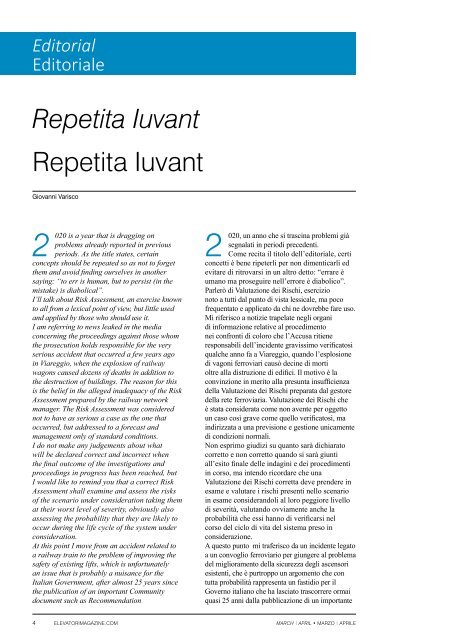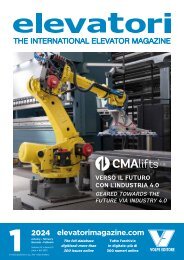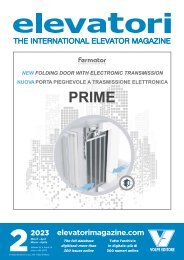You also want an ePaper? Increase the reach of your titles
YUMPU automatically turns print PDFs into web optimized ePapers that Google loves.
Editorial<br />
Editoriale<br />
Repetita Iuvant<br />
Repetita Iuvant<br />
Giovanni Varisco<br />
2<br />
020 is a year that is dragging on<br />
problems already reported in previous<br />
periods. As the title states, certain<br />
concepts should be repeated so as not to forget<br />
them and avoid finding ourselves in another<br />
saying: “to err is human, but to persist (in the<br />
mistake) is diabolical”.<br />
I’ll talk about Risk Assessment, an exercise known<br />
to all from a lexical point of view, but little used<br />
and applied by those who should use it.<br />
I am referring to news leaked in the media<br />
concerning the proceedings against those whom<br />
the prosecution holds responsible for the very<br />
serious accident that occurred a few years ago<br />
in Viareggio, when the explosion of railway<br />
wagons caused dozens of deaths in addition to<br />
the destruction of buildings. The reason for this<br />
is the belief in the alleged inadequacy of the Risk<br />
Assessment prepared by the railway network<br />
manager. The Risk Assessment was considered<br />
not to have as serious a case as the one that<br />
occurred, but addressed to a forecast and<br />
management only of standard conditions.<br />
I do not make any judgements about what<br />
will be declared correct and incorrect when<br />
the final outcome of the investigations and<br />
proceedings in progress has been reached, but<br />
I would like to remind you that a correct Risk<br />
Assessment shall examine and assess the risks<br />
of the scenario under consideration taking them<br />
at their worst level of severity, obviously also<br />
assessing the probability that they are likely to<br />
occur during the life cycle of the system under<br />
consideration.<br />
At this point I move from an accident related to<br />
a railway train to the problem of improving the<br />
safety of existing lifts, which is unfortunately<br />
an issue that is probably a nuisance for the<br />
Italian Government, after almost 25 years since<br />
the publication of an important Community<br />
document such as Recommendation<br />
2<br />
020, un anno che si trascina problemi già<br />
segnalati in periodi precedenti.<br />
Come recita il titolo dell’editoriale, certi<br />
concetti è bene ripeterli per non dimenticarli ed<br />
evitare di ritrovarsi in un altro detto: “errare è<br />
umano ma proseguire nell’errore è diabolico”.<br />
Parlerò di Valutazione dei Rischi, esercizio<br />
noto a tutti dal punto di vista lessicale, ma poco<br />
frequentato e applicato da chi ne dovrebbe fare uso.<br />
Mi riferisco a notizie trapelate negli organi<br />
di informazione relative al procedimento<br />
nei confronti di coloro che l’Accusa ritiene<br />
responsabili dell’incidente gravissimo verificatosi<br />
qualche anno fa a Viareggio, quando l’esplosione<br />
di vagoni ferroviari causò decine di morti<br />
oltre alla distruzione di edifici. Il motivo è la<br />
convinzione in merito alla presunta insufficienza<br />
della Valutazione dei Rischi preparata dal gestore<br />
della rete ferroviaria. Valutazione dei Rischi che<br />
è stata considerata come non avente per oggetto<br />
un caso così grave come quello verificatosi, ma<br />
indirizzata a una previsione e gestione unicamente<br />
di condizioni normali.<br />
Non esprimo giudizi su quanto sarà dichiarato<br />
corretto e non corretto quando si sarà giunti<br />
all’esito finale delle indagini e dei procedimenti<br />
in corso, ma intendo ricordare che una<br />
Valutazione dei Rischi corretta deve prendere in<br />
esame e valutare i rischi presenti nello scenario<br />
in esame considerandoli al loro peggiore livello<br />
di severità, valutando ovviamente anche la<br />
probabilità che essi hanno di verificarsi nel<br />
corso del ciclo di vita del sistema preso in<br />
considerazione.<br />
A questo punto mi traferisco da un incidente legato<br />
a un convoglio ferroviario per giungere al problema<br />
del miglioramento della sicurezza degli ascensori<br />
esistenti, che è purtroppo un argomento che con<br />
tutta probabilità rappresenta un fastidio per il<br />
Governo italiano che ha lasciato trascorrere ormai<br />
quasi 25 anni dalla pubblicazione di un importante<br />
4 ELEVATORIMAGAZINE.COM MARCH | APRIL • MARZO | APRILE














